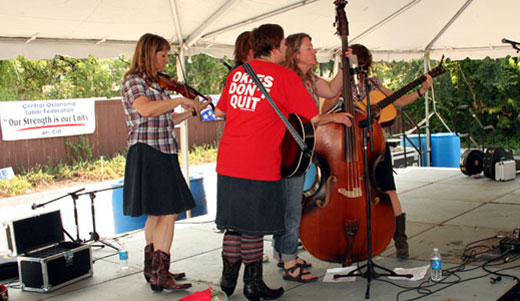
OKLAHOMA CITY – At 10 AM on Saturday, August 27, Unionists and friends affiliated with the Central Oklahoma Labor Council (AFL-CIO) gathered at the Catholics Charities office and marched up NW 16th street to the Plaza District. African American, Native American, and white residents of the working class neighborhood came out on their porches to watch the block-long procession.
“Everywhere we go,” went the call and response chant, “People want to know, who we are, so we tell them, we are the union, mighty mighty union. Union! Union! Union!” JD Thompson led the marchers in a lusty “Solidarity Forever.” At their destination, a canopy over a parking lot awaited to shield them from the 105-degree heat.
Thompson grabbed his waiting guitar and, in a mellow voice, sang “Praise Boss,” a very short rip-off of religion’s “Doxology.” Then he launched a country blues version of “The Banks are Made of Marble” that was as good as any ever heard. The third and final day of the second annual Oklahoma Laborfest was underway!
It may be difficult to measure, but it certainly seemed that unionism was tremendously strengthened during those three days of history, poetry, paintings, cultural presentations, movies, music, especially music, workshops, and political messages imparted.
The labor fed’s president, Tim O’Connor, introduced each phase of presentations with modest, simple, and direct language, but the presentations themselves were stunning in their power. They ranged from down-home twangy original music to highbrow poetry readings presented while Oklahoma’s outstanding artist, Carlos Tello, created a big-canvas masterpiece onstage! Decades of labor’s forced retreats melted away as we reminded ourselves, together, of the beautiful and brave sacrifices and accomplishments of Oklahoma working people.
Unlike a lot of labor historians, cultural director Rachel C. Jackson did not hide the contributions of Communists in the workers’ story. One of the highlights was a complete reading of the late red organizer Eli Jaffe’s play, “Nor Iron Bars,” about his time in the Oklahoma City jail on trumped up sedition charges during labor’s 1930s upsurge. Oklahoman Woody Guthrie was sung and praised.
The best was last. “Oklahoma Speaks,” the previous year had focused on union history, but for 2011, Jackson selected readings from the outstanding civil rights history of the state.
One of the readings was the original civil rights motion presented and passed at the state’s constitutional convention in 1906.
Another was from the memoirs of the state’s leading civil rights activist from 1950s and 1960s. It was read by one of the young students who participated in the 1958 lunch counter sit-in described.
Between each reading, a women’s musical ensemble harmonized on beautiful new and traditional civil rights songs.
The high point of this all-high experience was at the end of one reading, when the silence was pierced by a single Native American flute. Tom Mauchahty-Ware, in full ceremonial regalia, emerged from stage left and slowly made his way around the back of the stage to one of the microphones. He played only a moment, then sang a short Kiowa love chant and turned and fluted his way back as he had come, as silently, as mysteriously, and as omnipresent as Native Americans remain forever in Oklahoma.
A few minutes later, as the moody readings and music ended, Mauchahty-Ware emerged again, without changing outfits but strapped to a modern electric guitar. He joined JD Thompson and the other musicians in a solid blues jam to top off the evening and the Oklahoma Laborfest for this year.
Photo: The band MAW singing at the Oklahoma Laborfest Aug. 27. Jim Lane/PW












Comments